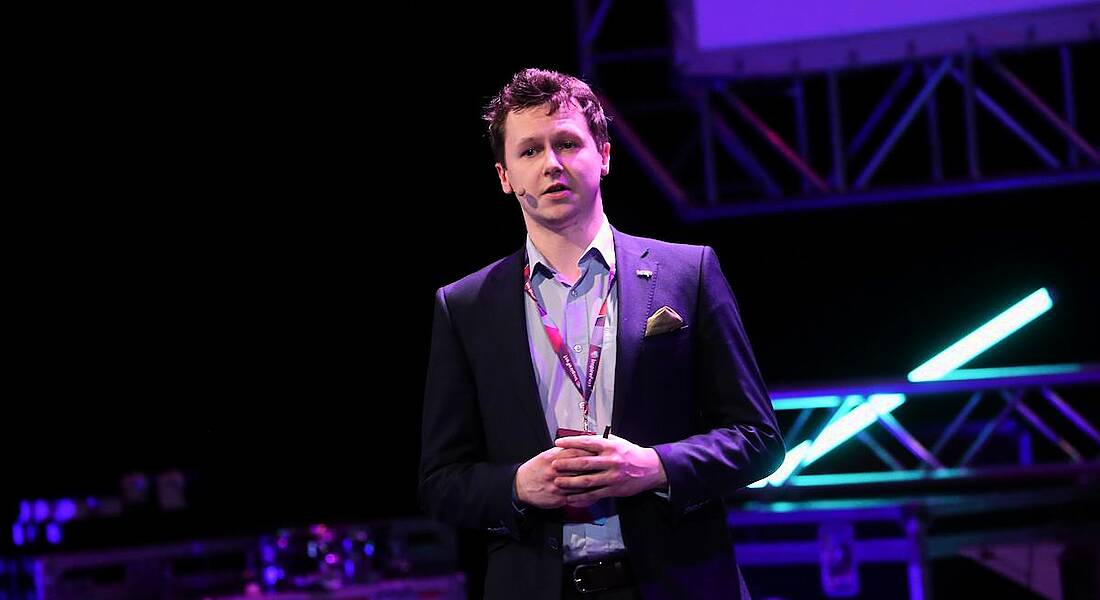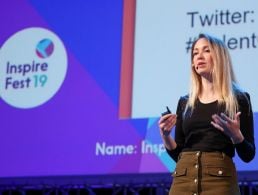AsIAm.ie founder Adam Harris is on a mission to make Ireland the most autism-friendly country in the world. But how do we get there?
Adam Harris was diagnosed with autism when he was five years old. After a childhood spent experiencing awkward reactions and panicked looks when he revealed to people that he was autistic, he was spurred on to set up AsIAm.ie in 2013, during his Leaving Cert year.
Now a team of 12 people, AsIAm.ie is a vital resource for the Irish autistic community, providing support and empowerment as well as creating awareness about the condition for others. However, as Harris pointed out at Inspirefest 2019, awareness and understanding are two very different things. “I’m aware that Mandarin Chinese is a language but I don’t understand it.”
With the majority of autistic children now attending mainstream schools, the workplace of the future needs to be prepared for them. On that note, Harris laid out a vision for a workplace that not only accepts the autism community but appreciates the value of their neurodiversity.
Why is it hard for autistic people to get a job?
While we as a society might mean well and make an effort to include autistic people in everyday life, this isn’t always reflected in the world of work.
Harris listed an array of barriers that might impede an autistic person’s first steps towards their career path, including unwritten communication, unclear hierarchical structures and sensory processing difficulties. When we do nothing to help break down these barriers, the consequences can be dire, ranging from social isolation to mental health challenges and even a shorter life expectancy.
The fact is that there needs to be more action than talk. People are often quick to laud measures such as supermarkets introducing ‘quiet evenings’ once a week to cater to autistic shoppers, but how often do they implement real changes in their own practices? Would they hire an autistic person to work in their own organisation? Harris gave an example of a job interview whereby a candidate, though fully qualified for the role, may be looked over for their inability to make eye contact with the interviewer.
This lack of diversity in hiring practices can be of detriment to the company itself. “I can tell you, you desperately need autistic staff,” urged Harris. “You have autistic customers and it simply doesn’t make sense to design products or to be a company that does not represent a significant part of the market.”
Just because autism incorporates an alternative way of thinking doesn’t mean it’s wrong, Harris said. Indeed, it is probably fair to say that we spend too much time focusing on how autistic people don’t fit within our rigid margins of ‘normal’ rather than recognising how their differences make them unique and talented in their own way.
“We believe that many of the barriers autistic people face are nothing to do with being autistic; they’re to do with how the world happens to work,” Harris said. So, if many of these roadblocks are created by society itself, what can we do to rectify the situation? What steps can we take to ensure that autistic people are welcomed into the world of work?
How can we be more autism-friendly?
With recruitment specifically, Harris said we should aim to ‘autism-proof’ our traditional practices. This includes:
- Writing a crystal-clear job description
- Removing the interview process altogether, thereby assessing a person’s skills rather than their performance on the day
- If this is not possible, the interview itself should be tailored to be predictable and sensory-friendly for the candidate
It doesn’t stop there, though. Once you have hired an autistic person, you as an employer should do everything within your power to make the transition to a new working environment as smooth as possible for your new recruit. This includes:
- Embedding ‘autism-proofing’ as part of the universal design process
- Making the office environment accessible (the AsIAm.ie Sensory Checklist tool is a good place to start)
- Ensuring workplace policies recognise neurodiversity and celebrate it
- Educating everyone in the organisation about what autism actually means
- Supporting those who want to tell their stories about autism
Though by no means an exhaustive list, the above introductory steps are both small and easily achievable, meaning there is no excuse not to support Harris’s vision “to make Ireland the world’s most autism-friendly country”. There is still a lot of progress to be made but we are on the right track, and he believes the tide is turning on the stigma surrounding autism. It is now up to us as a society to continue riding that wave.
“As we see the first generation of autistic people grow up, we need to make a decision: do we want to live in a society that is truly about equality and inclusion, or do we want to leave one in 65 people behind?”
Inspirefest is Silicon Republic’s international event celebrating the point where science, technology and the arts collide. Ultra Early Bird tickets for Inspirefest 2020 are available now.




